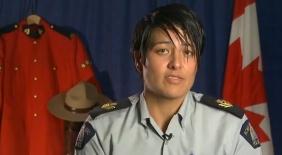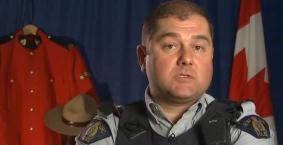
Sergeant Jolaine Percival says she's never had a problem being out in the force but says she used to be concerned about the guys who felt they had to be closeted. Credit: RCMP
Canada’s RCMP has added its voice to the global It Gets Better movement, joining the more than 50,000 videos in circulation that aim to inspire hope in young people who confront homophobia.
The RCMP’s almost 10-minute video, launched Nov 5, features 20 Mounties who candidly recall the challenges they faced growing up, how they confronted their sense of being different, and the decision to come out to their families.
After a number of young people took their lives as a result of bullying, syndicated columnist Dan Savage and his partner, Terry Miller, launched the It Gets Better movement with a YouTube video in September 2010 to send a message of hope.
Constable Cheryl Letkeman, who spearheaded the RCMP’s initiative, says she was inspired to get RCMP members involved in the It Gets Better project after noting that a number of American police forces had posted videos to the campaign’s website.
“I just thought to myself, ‘Why haven’t the RCMP done this?’” says Letkeman, who is with the Surrey RCMP Youth Unit. “So instead of just wondering why, we did it.”
She says a proposal she submitted in March received “amazing support” from higher-ups, after which she sent out an email to Lower Mainland detachments to canvas members who would be interested in participating in the video. “We got the 20 people who appear in the video; everybody who showed interest was in the video,” she says.
“I think it’s important for youth to see police officers, or people that they tend to look up to, provide positive role models for kids who might be getting bullied or targeted because of their actual or perceived sexuality,” Letkeman says.
“I didn’t have anybody particularly as a positive role model growing up, someone to say, “You know what, it’s okay, and it’s going to get better, which is the ultimate message — because high school stinks,” she adds with a laugh. “I just don’t want another kid to feel like there’s no hope.”
She says people are going to be surprised at the candour and honesty of the police officers who appear in the video. “It’s the people who are the police officers giving that message and who have felt some of the struggles that today’s youth are feeling.”
In the video, RCMP dispatcher Maya Simbul, who calls herself a “strategic planner,” says she decided she could be herself only after leaving high school. “Until then, hide it away” was her motto. “I hid it right till the day I graduated.”
Several Mounties recall the menu of slurs that they endured as they were growing up: queer, faggot, fucking faggot, lezzie, effeminate.
“There wasn’t one single positive message,” says Constable Theresa Gajecki, who says slurs were unleashed with “such malice.”
As for coming out to parents and other relatives, the Mounties tell stories that run the gamut from the matter-of-fact, to the humorous, to the touching.
Corporal Robert Ploughman says his mother “cried for three years straight” when he told her he was leaving the priesthood because he is gay.
“My dad just accepted me; it was never like I had to have a conversation,” says Constable Kelly Power, her eyes beginning to well up.
Mark Greenfield says his father, whose initial response he couldn’t predict, has turned into a “proud, gay parent” who now outs him to people. “I’ve kind of had to ask him to tone that down a bit.”
Sergeant Jolaine Percival, who has been with the RCMP for 15 years, says she’s been out from the very beginning.
Percival, whose brother is also gay, says they grew up in a small community on the Sunshine Coast and feels the video “hits home” for anybody who has the experience of feeling different. “The big picture is that there have been thousands of people before them, and there will be thousands of people after them, that will have to go through this.
“Because of the connection of the internet and all the role models they can see, it’s a lot better for people to realize there are successful firefighters and police officers and lawyers and athletes that are gay,” she says.
Investigator Kori Power, of the integrated homicide investigation team, says raising the visibility of police officers who are gay breaks the social construct that “you need to be a traditional straight man to become a police officer.”
He says he hesitated about being in the video only because he was interested in covert operations.
By participating in the video, he says, that career opportunity is gone. He says he is a little disappointed, but the video was such a good project he couldn’t say no.
He says he hopes the video has a positive impact against bullying. “The bullies aren’t going to be able to think that the police are going to roll their eyes at the bully and agree.”
Powers says being gay in the RCMP has been a positive experience. “My boyfriend comes to all the Christmas parties; they think he’s fantastic.”
He says he doesn’t know what it would be like to be in a detachment in Alberta or Saskatchewan, but from his perspective, the RCMP has a “pretty decent diversity mandate.” He says the old boys’ club is “a thing of the past.”
Percival also says she’s never had a problem being out in the force, but says she used to be more concerned about the guys who felt they had to be closeted.
She says it was still an old boys’ club when she joined the RCMP.
Nowadays, she says, the men are more able to be themselves. “People are prepared to stand up and say, ‘Listen, don’t make that comment,’ and supervisors are willing to react more.”


 Why you can trust Xtra
Why you can trust Xtra


